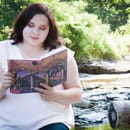In March 2018, hundreds of thousands of demonstrators flooded the streets of Washington D.C., protesting gun violence in America. March For Our Lives was planned by mostly high school students who had seen the effects of gun violence first hand. Her Campus at WVU got the chance to interview one of the organizers herself, Bria Smith.
HC: Please state your full name, hometown, and age.
BS: My name is Bria Smith and I am a 17-year-old senior from Milwaukee, Wisconsin.
HC: Why did you not support the March for Our Lives Movement originally?
BS: I wouldn’t say that I was unsupportive of the goals of March For Our Lives when it was first created. I was biased in my own thinking, I judged them critically, and unfairly, projecting my lack of involvement on teenagers who I believed did not care for brown and black youth. I was mostly hurt by the realities of my own community, the gun violence that I would witness on a daily spectrum, the deaths of children and the abuse of police authority jeopardizing the lives of so many individuals who shared a community with me. My criticisms of MFOL was merely the lack of representation that I saw. I didn’t see many kids of color from inner cities, but that was mainly because of the fault of media, it’s bias and segregation, not that of the Parkland students.
HC: What drew you to get involved with the March For Our Lives movement?
BS: I believed that fate brought me to be apart of the March For Our Lives movement. After speaking at my sister march in Milwaukee about the intersectionality of gun violence and enforcing inclusivity, I strayed away from the movement and worked locally. It was June, when I was finally reconnected with the movement, speaking on a Road to Change stop in Milwaukee. Speaking truths into reality, engaging my community and hoping to highlight the rise of gun violence that’s been affecting our streets. I love feeling that my voice was validated, that what I had to say was validated. Witnessing gun violence at a young age and normalizing and conditioning this violence into a repressed way of living scared me, and I was tired of being confined to it. I was attracted by the strength of the movement just then, how thousands of people held the same judgements, aspirations and hopes for reforming a system that is failing so many people.
HC: Have you been an activist for any other movements in the past few years? If so, why are you passionate about these issues?
BS: As a black woman, it took me years to understand my self worth and beauty. I was obsessed with the succession of my community, enraged by media as it captured the extremity of police brutality and injustice. I was fueled by the Black Lives Matter movement and the way it was able to restore hope and peace, empower millions of individuals across the country, bind us together with power and sentiment. In my community I focused my energy on the advancement of black people, joining organizations that uplifted minority voices, such as Leaders Igniting Transformation, Black Achievers and Freedom School. Within the Black Lives Matter movement, comes a spectrum of components that I advocated for. The school-to-prison pipeline, police brutality, mass incarceration, clean water, health care. My community has been affected by these injustices for years, and I worked with other youth leaders and adults to help heal it.
HC: Why are you passionate about these issues?
BS: I have always been an individual who complained, and complained and complained, so much that people would tell me to “do something about it.” A statement that I drew literal conclusion from. In my times as a child, I questioned a lot of things and always tried to stick up for what I believed in. My passion derives from an anger I have learned to embrace.
HC: How do you think America should tackle the issue of gun violence?
BS: America is a country built on the culture of idolizing violence, and a society who embraces it. Implementing policies that best restrict the attainment of firearms such as universal background checks. Limiting the over excessive usage of a firearm, such as banning bump stocks, disarming domestic abusers and enforcing a high capacity magazine ban. But with policy, comes reformation of the mind and culture of a community. I’ve noticed that in my community, these policies aren’t beneficial. With that, we encourage funding gun violence prevention organizations that work closely with members of their community, restorative justice practices and civil justice workshops.
HC: What new perspectives do you hope to bring by joining the March For Our Lives Movement?
BS:I hope to bring the perspective of those who’ve been overlooked by media, not handed an expansive platform to share their truths and stories. I hope to diversify its message and promote intersectionality, so that every person is able to establish a space and feel comfortable, supported enough to share.
HC: Is there anything else you would like the readers to know?
BS: I want people to know that this summer has been one of the best learning experiences for me. I traveled on a bus with a bunch of strangers-turned-family, who all hoped to changed the world. I was able to engage with hundreds of youth, speak about my truths and see the raw and authentic side of this movement. We were revolutionaries, connecting with other youth revolutionaries, planting seeds and watering them for the future.


